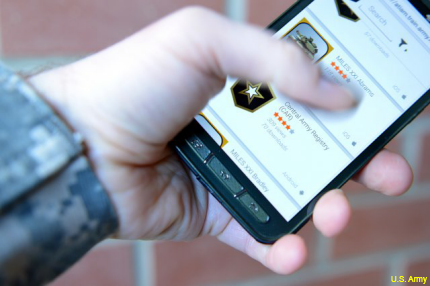Army opens a mobile app store
The Training and Doctrine Command’s site will host existing applications and facilitate the creation of new ones.

The Army has opened a mobile app store that not only makes existing applications available but allows for the development of future apps, whether by request from soldiers or created by soldiers themselves.
The service’s Training and Doctrine Command, or TRADOC, has opened the store at www.adtdl.army.mil, which users can access using their Army Knowledge Online login and password, the Army announced. Using a Common Access Card is optional.
Lt. Col. Joseph A. Harris Jr., TRADOC capability manager for mobile learning, noted that most soldiers have some type of mobile device and are used to getting their information that way. "They are using those devices every day to get the information they need. And usually, that's through a mobile app of some sort,” he said. “What we are trying to do is ensure that we use what they are using already in order to get the information to them. We have a digital Army, and soldiers have that digital mindset—and we are just capitalizing on that.”
For starters, the TRADOC Application Gateway, or TAG, hosts only a few of the TRADOC-produced apps that are already available from commercial stores. Among the titles available are "DFAS Info2Go," "GoArmyEd," "Performance Triad," and "Army Comprehensive Doctrine,” which are being used to evaluate the new site. TRADOC plans to put 100 to 150 apps—in Android, Apple and Windows platforms—on TAG.
But what could make TAG more valuable is the development of new apps. “Anybody can request an app,” said Matthew MacLaughlin Jr., senior mobile instructional design specialist, who added that he has a team of six developers who can work on all three platforms. As well, the team is available to help users or organizations build their own apps. "We want to empower them and give them guidance on how to build their mobile applications correctly," MacLaughlin said.
TAG will likely contain mostly learning software (all of it unclassified), but is expected to grow into part of a larger Army software marketplace.
Down the road, MacLaughlin said, TRADOC would send developer teams out to Army components to help developers create their own apps. "They won't have to go through us to create that mobile app,” he said. “They will create it there, or as much as they can, and that can shorten the development timeline."
Of course, any app will be vetted for the security of its code and the accuracy of its information before it appears in the store, said Brian Robertson, program integrator. Robertson said some organizations that already offer their own apps have asked if those apps can be moved to TAG.
He said already Army organizations who are independently hosting their own apps are asking that they be transferred to TAG. And any organization that does move its apps to TAG needn’t worry about its intellectual property rights, Harris said. “(T)hey won't lose ownership of their apps. They'll be hosted on the TAG, but they will still own and get the credit for them," he said.




